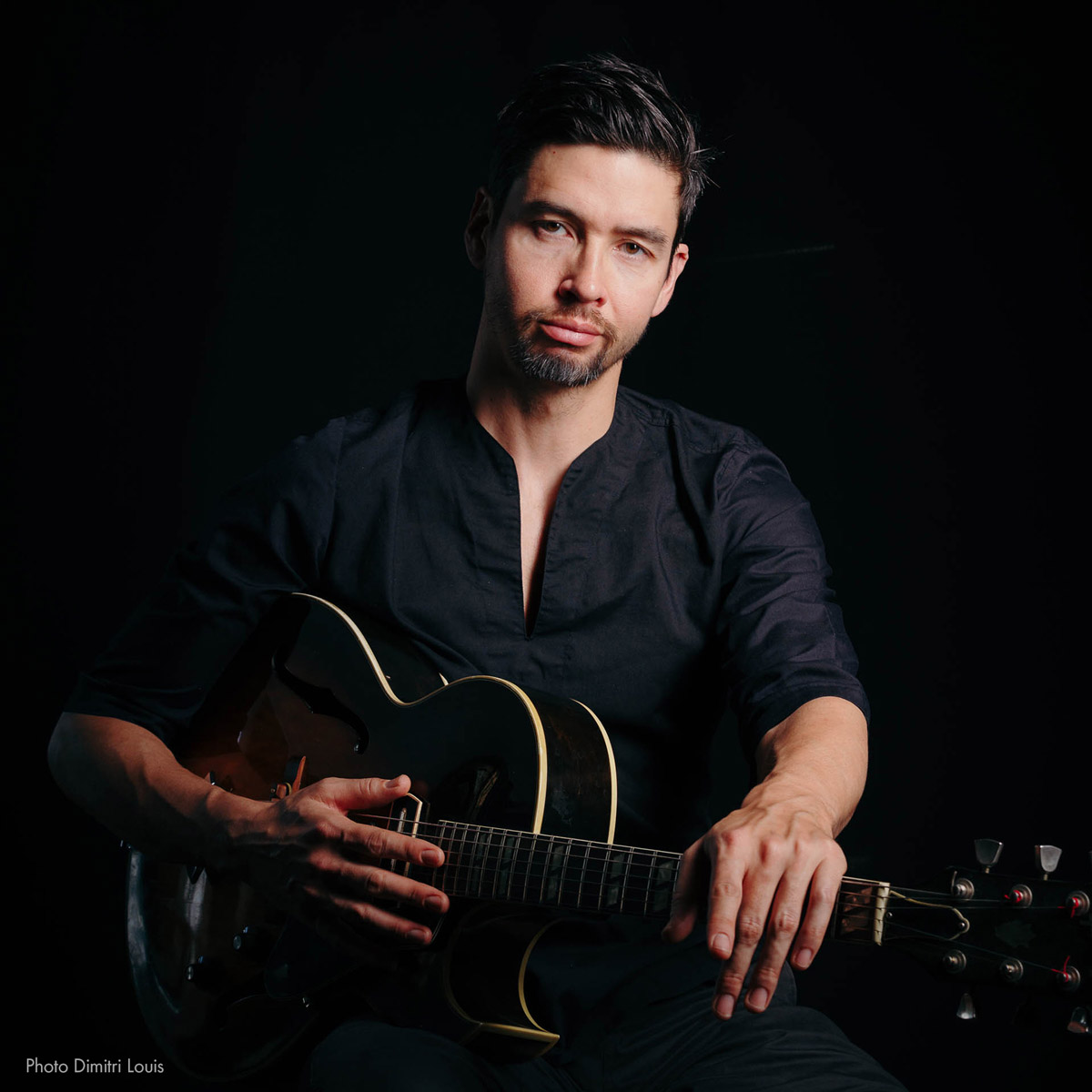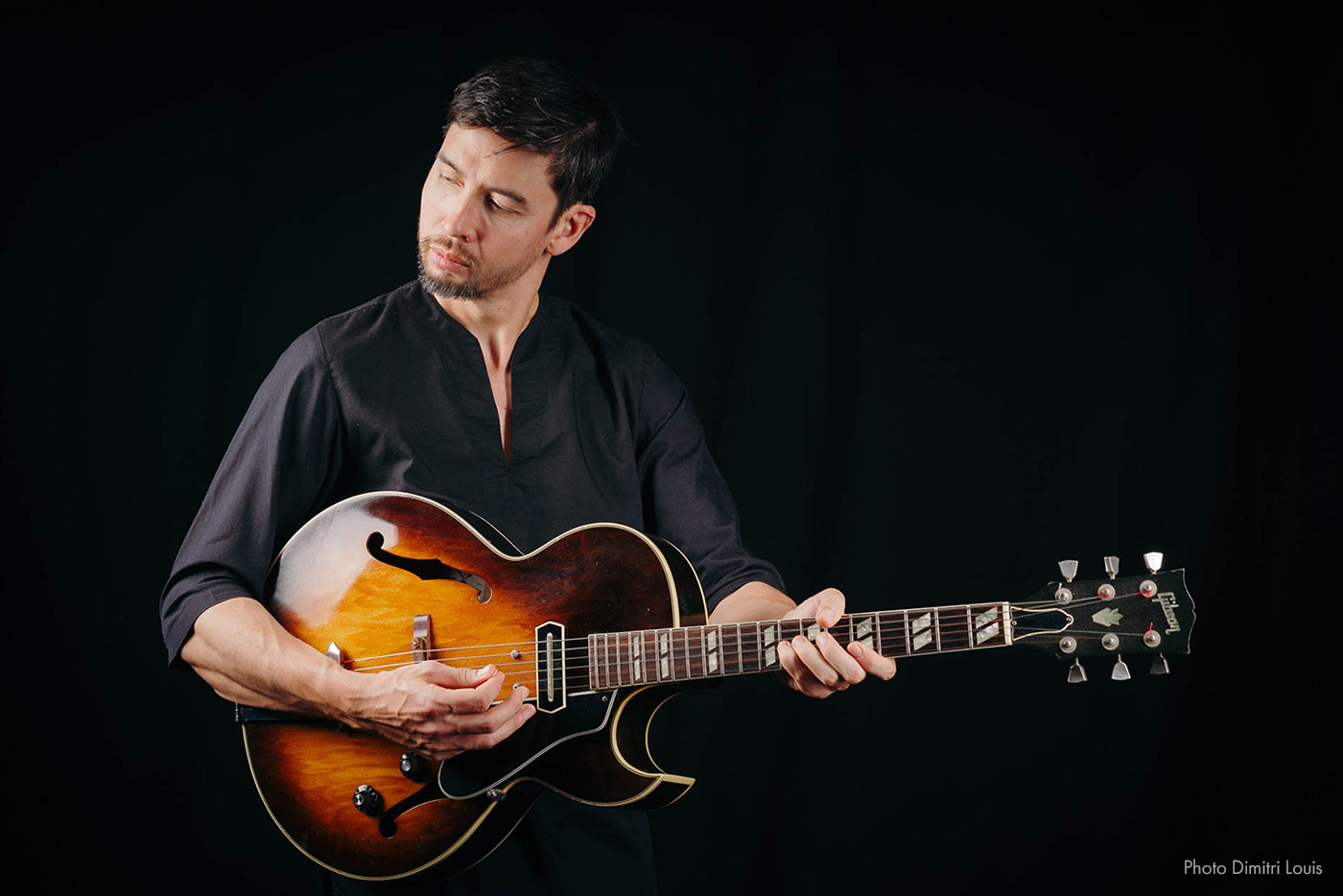 Miles Okazaki is an outstanding guitarist and composer. His music is characterized by a constant and deep musical research especially for what it concern rhythmical and melodic shapes. He has been part for a long time of the Steve Coleman’s Five Elements and beside that he produced many interesting albums as a leader. His recent project is the band “The Tricksters”. Currently Miles is also an assistant professor of jazz guitar at the University of Michigan in Ann Arbor.
Miles Okazaki is an outstanding guitarist and composer. His music is characterized by a constant and deep musical research especially for what it concern rhythmical and melodic shapes. He has been part for a long time of the Steve Coleman’s Five Elements and beside that he produced many interesting albums as a leader. His recent project is the band “The Tricksters”. Currently Miles is also an assistant professor of jazz guitar at the University of Michigan in Ann Arbor.
Nicola Fazzini: Some years ago I had the chance to spend time on tour with you and the band of the Italian drummer Ananda Gari. For me your music was very interesting, quite complex, but the concepts of each composition was very clear. What is your approach composing music? Do you follow a process for it or is more on inspiration?
Miles Okazaki: Thanks, I’m glad you enjoyed playing them. I usually start with something I’m trying to figure out, a musical problem. This may turn into an exercise, which may then turn into a composition. There is no method, except to follow the ear. Lately, I want the compositions to be as simple as possible, trying to trim the fat. A clear idea, without extraneous or unnecessary elements.
NF: How do you match the complexity of composing with the spontaneity of the improvisation?
MO: Improvisation can be as complex as anything that you spend a long time thinking about and doing slowly. We know this from Bud Powell, Charlie Parker, and all of the great improvisors. I try to speed up my composing process so that it becomes more improvisational, and slow down my improvising in order to pay attention to more detail. So, they’re basically two sides of the same coin.
NF: The musical material you develop in your music is particularly sophisticated: different rhythmical meters, pitch class sets and recently microtonality. What were your influences for this and can you give us an idea about how and why you mix all these approaches?
MO: I read and study a lot, so I could list a lot of books, but most of my influences are from other people. For rhythm I work with drummers – Dan Weiss has taught me a lot of stuff over the years, for example. And Sean Rickman, Damion Reid, Nasheet Waits, other great drummers, each of whom has their own perspective. Amir El Saffar has taught me a lot about microtonal stuff, and Dave Fiuczynski. Pitch class stuff is mostly from books, John Rahn, Elliott Carter, etc. But the way I do it is a bit different, as I’m focused on improvisation and sound, rather than numbers. I’ve studied all of these topics in great detail with Steve Coleman, who is probably the most thorough and obsessive student of music that I know.
NF: How do you organize your work to develop these ideas and how do you practice them?
MO: Do a little every day, of whatever is interesting to you. I have small tasks to complete every day, and then the rest is improvised. Like, make the bed, and then go about your business for the day. If you make the bed and wash the dishes, other things will be ok because you are developing the proper habits and discipline. I follow my interests rather than what I “should” be working on, according to someone else. This way I will make more progress and the results will stay in my memory. When you are younger, though, you should do what your teacher tells you to do, because you don’t really know what to work on.
NF: What is your approach in sharing these concepts with the musicians who play in your band?
MO: I don’t really share concepts unless people want to know. It’s like, do you need to know how your car works? Some people are curious, so they open it up and mess around with it. Others just want to drive and get to where they want to go. The important thing with the band is to get to the result. If the concept helps to reach the sonic result, then I will talk about that. Matt Mitchell, for example, is good at working off a concept and generating sounds from that. Craig Taborn also. Sean Rickman is better at going directly to the sound, from me singing or playing something to him. And he will get a more interesting result this way than anything that I could come up with conceptually. But personally, I like to know how the car works.
NF: As the historian Hobsbawm said, there are traditions that have been “invented” and the meaning of tradition in itself is somehow artificial. In fact, not all cultures consider or give a meaning to this concept. Do you think that does it makes sense to speak about a “jazz tradition” for a type of music with such a short history? What is your approach to the jazz tradition? What is the balance between tradition and innovation in your vision of music?
MO: I played an album of Thelonious Monk’s music. This is my take on tradition – it’s a just a person. Monk is one person, John Coltrane is another, Morton Feldman is another, Jimi Hendrix is another. Some people are connected to each other culturally, like the black American musicians who created the body of work that you are referring to. But I don’t use the “J” word, as I don’t like to put an umbrella over a bunch of people and assume that they are all thinking about the same thing. I don’t really want to be confined in that way, either. So I just try to deal with each person as they are, an individual.
NF: You are doing an interesting experiment proposing every day on your Instagram profile a different pitch class set, with a graphic representation and an audio example. Could you tell us something more about this? You often use graphic representation of your music. Could you tell us something about this?
MO: Staff notation is graphic, so what I’m doing is just the same thing, but in a circle instead of a line. We all know you can take a line with two endpoints and bend it around in a circle, and then it goes forever. Before I learned staff notation, I thought of the notes in this way. The Instagram thing, that’s just my daily study like I was talking about before, “making the bed.” Doing it in public just makes it more interesting to me, as I get some feedback and more ideas. Each post is not that involved, but after 351 days, I will have gone through every possible scale in the equal tempered system. This is how you eat an elephant, one bite at a time.
NF: What are you listening to in this period? Which artists are, in your opinion, doing something innovative and interesting today?
MO: I’m not listening to much of anything. I spend my days cooking, cleaning, gardening, and fixing things around the house. I have three kids here, so when I have some free time I go to practice. I don’t know what people are doing right now, but there will definitely be some different shit happening when we come out of our houses and back into the world.


